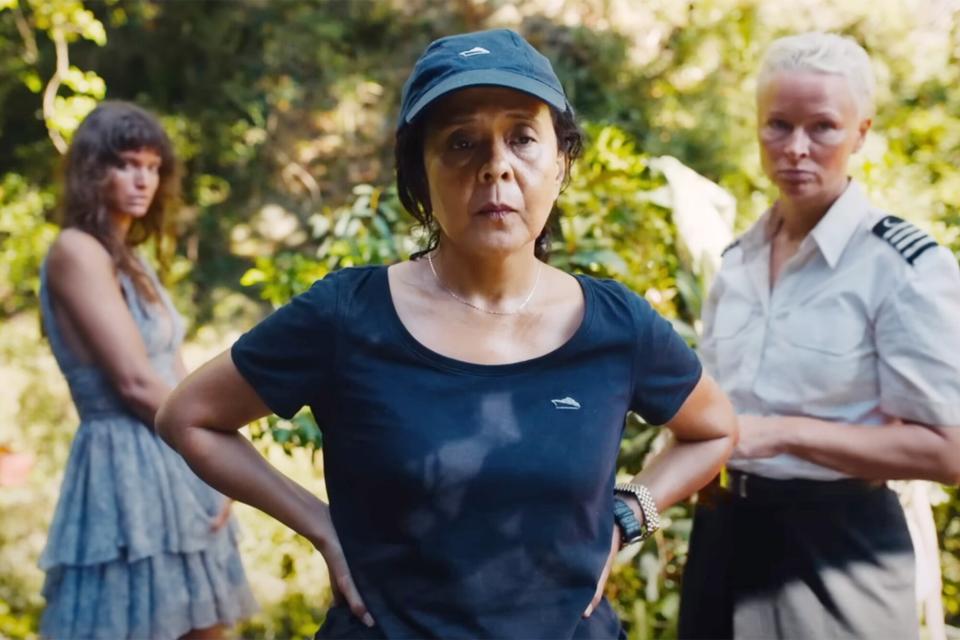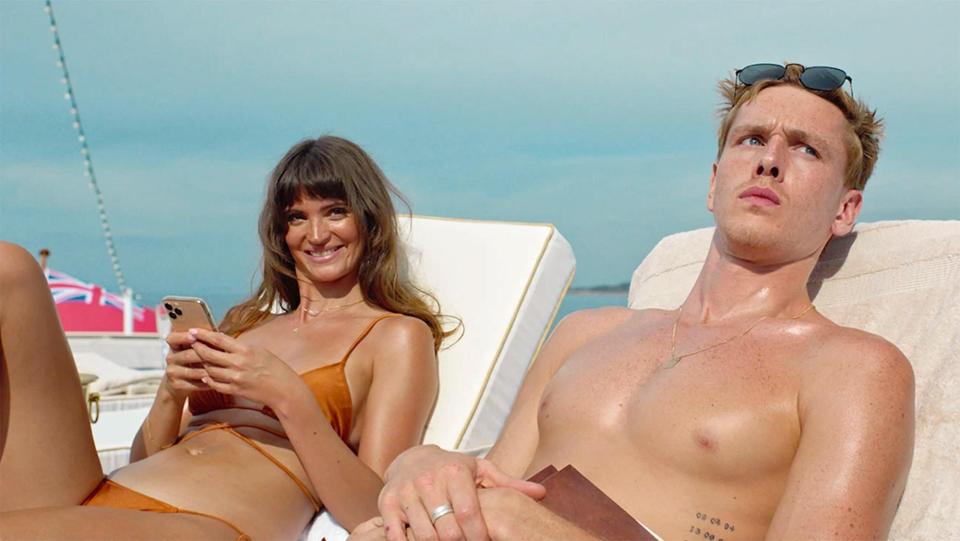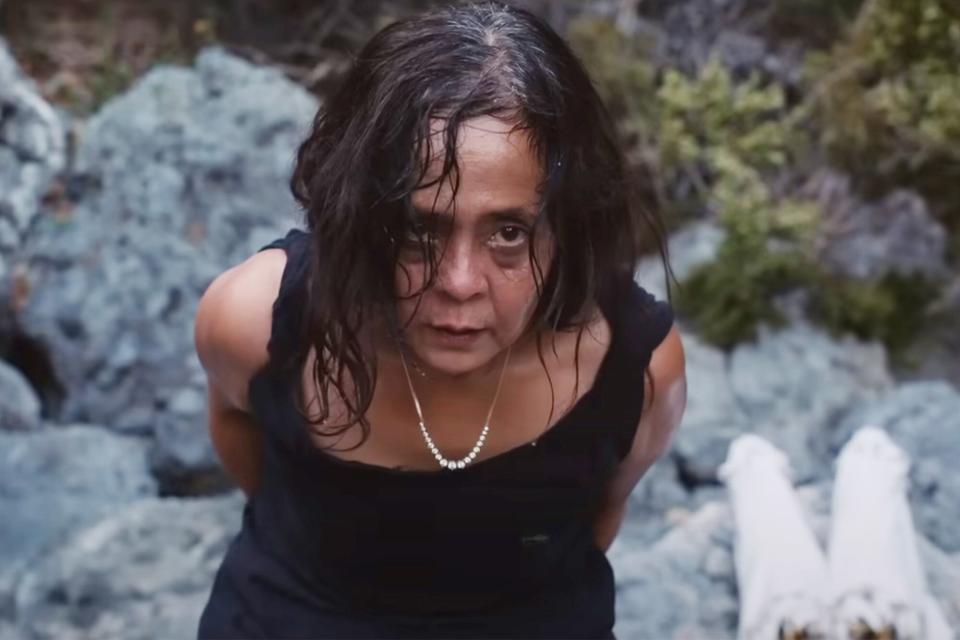Dolly de Leon's performance in Triangle of Sadness is groundbreaking — here's why
There's a scene in Ruben Ostlund's scathing satire Triangle of Sadness where a group of nameless service staff on a luxury cruise efficiently clean an opulent dining room covered in vomit. (The moneyed passengers who previously occupied the space were sickened when a violent storm hits just as they sit down to a private, exquisitely pretentious dinner.) As the all-female crew mop and sanitize and quickly restore order to chaos a few hours later, Ostlund captures how they just get to it, completing the thankless task as their higher-class counterparts loudly bemoan the situation, their sound and fury signifying, ultimately, nothing.
The film shifts into its tropically dystopian third act soon after, when a shipwreck leaves a handful of the passengers on a seemingly deserted island. The cleaning crew's focused resilience crystallizes in the form of Abigail, played by Filipino actress Dolly de Leon. She swiftly rises from toilet cleaner to captain when it becomes clear that she's the only one of the survivors who has actual practical skills: she can build a fire, catch fish, cook — all things that become paramount on an island where Rolexes and money and Instagram are as meaningless as the washed-up detritus littering the shore.

Neon/Everett Charlbi Dean, Dolly De Leon, and Vicki Berlin in 'Triangle of Sadness'
Abigail is very familiar to me — as the daughter of Filipino immigrants, I have relatives and family friends who work in the service industry, as nannies, kitchen cooks, housekeepers, and yes, cruise ship workers. Their stories are rarely portrayed on screen, and if they are, the characters are in the background, tending to children, cooking behind the scenes, knocking on hotel room doors and yelling "Housekeeping!," while their white employers drive the plot. Quiet and unassuming, my loved ones kept (and keep) their heads down, absorbing microaggressions under a layer of agreeableness, their smiles protecting their livelihoods.
Which is why it was so meaningful for me to see de Leon's Abigail emerge, forcefully and unapologetically, as the leader of the deserted island group that includes a model/influencer couple (Charlbi Dean and Harris Dickinson), a Russian billionaire (Zlatko Buric), a tech boss (Henrik Dorsin), and cruise chief of staff (Vicki Berlin). Without the class structures of their pre-shipwreck lives, it's clear that there are new rules. And that Abigail — who didn't even register to them (or viewers) on the cruise — now held all the cards on the island.
"This is a huge statement on what a certain amount of power can do to a person regardless of their status in life," de Leon, 53, tells me during an interview at EW's Los Angeles offices in early November, shortly before she boarded a flight back to her hometown of Manila. "If [Abigail] suddenly has this skill that no one else [has], suddenly they're holding the trident, they are queen, and no one else can take it away from her, despite the fact that she's a woman, that she's Asian, that she's middle-aged."

Neon Charlbi Dean and Harris Dickinson in 'Triangle of Sadness'
In one of the film's funniest scenes, Abigail has single-handedly caught and cooked a pile of seafood, and rations out portions to her fellow survivors, but keeps most of it for herself. She then tosses out additional bites of food only when her hungry peers acknowledge her as their captain. Abigail's rejection of the hierarchy continues when she summons pretty boy model Carl (Dickinson) to sleep with her in her lifeboat, while the rest of the group, including his outraged model girlfriend Yaya (Dean), sleeps on the beach.
"Abigail chose Carl, not because he's physically the most beautiful, but it really was more of a comeuppance to show these people: 'Look at how powerful I can be. I can take the best of your world and use him in whatever way,'" says de Leon, who is garnering Oscar buzz for her movie-stealing performance. "But it's also quite sad if you think about it, because she chose to play their game instead of changing the way things are happening on the island. You can't blame her because that's all she knew."
It's a movie, so Abigail does some outrageous things. But just as much outrageousness occurs before the ship goes down. The wealthy and the beautiful that the first two-thirds of the film centers on are no less ruthless and transactional than Abigail. The difference is that their actions play out in dynamics that audiences, unfortunately, are used to seeing when it comes to the treatment of underrepresented groups, on screen and off.
Still, it was crucial to de Leon that Abigail had a backstory, with heartbreak and history fueling her behavior. "She worked at a very rich family's house at a very early age," the actress explains. "She fell in love with the son of her boss but he wasn't in love with her. She got pregnant, they kicked her out of the house, [and she] had to fend for herself because she was ostracized by her family. With all that pressure, she had a miscarriage and decided to leave everything behind while hating men, hating rich people, going abroad, changing her life."

Neon/Everett Dolly de Leon in 'Triangle of Sadness.'
Her character work aside, de Leon felt the intense pressure of representing her country. Film roles that are written as Filipino are still few and far between, though this year also saw the theatrical release of the Jo Koy-fronted comedy Easter Sunday. For de Leon, the bigger picture was never too far out of sight.
"I was terrified because I didn't want to misrepresent us Filipinos," she says. "I didn't want to represent our workers abroad. I didn't want them to think that I was making fun of them or I was making light of their jobs. So I think that's the strength that you see in Abigail; I really had to work hard to show that she is a woman of power and she's using it with elegance and grace. I wanted Filipinos and other ethnicities who are in the service industry to have a sense of pride and to see someone who is true and real and not someone who is a caricature. I really tried to make her as human as possible so that people can relate to her and not see her as a butt of jokes."
I certainly didn't see her as a joke. As a Filipino woman who's made a decades-long career of writing about Hollywood — and working in the largely white, privileged space that is entertainment journalism — I'm no stranger to the feeling that I'd be as invisible as Abigail to certain people if I didn't happen to be interviewing them or working with them. It's gotten better in recent years, of course. But that's why portrayals like de Leon's, and projects like Triangle of Sadness, are so important. Because they present background characters as foreground.
And that's groundbreaking.
Triangle of Sadness is in theaters now.
Related content:

 Yahoo News
Yahoo News 
